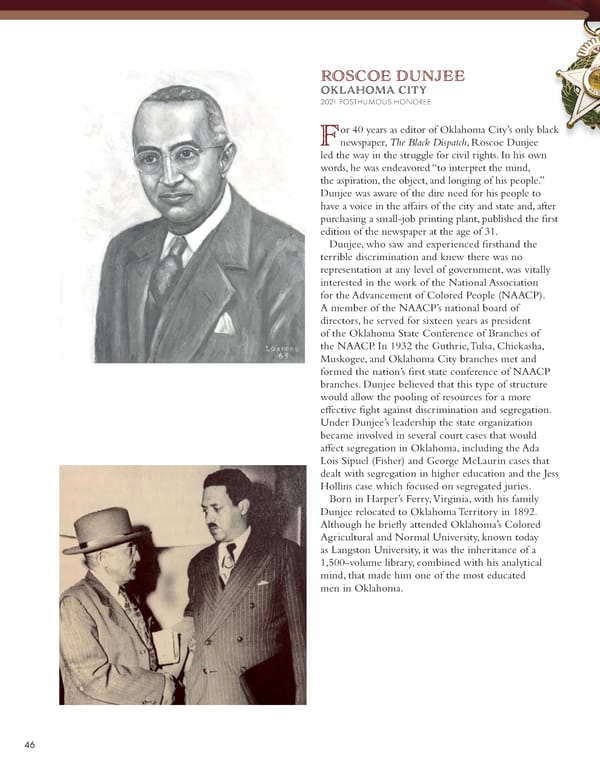ROSCOE DUNJEE OKLAHOMA CITY 2021 POSTHUMOUS HONOREE or 40 years as editor of Oklahoma City’s only black Fnewspaper, The Black Dispatch, Roscoe Dunjee led the way in the struggle for civil rights. In his own words, he was endeavored “to interpret the mind, the aspiration, the object, and longing of his people.” Dunjee was aware of the dire need for his people to have a voice in the affairs of the city and state and, after purchasing a small-job printing plant, published the first edition of the newspaper at the age of 31. Dunjee, who saw and experienced firsthand the terrible discrimination and knew there was no representation at any level of government, was vitally interested in the work of the National Association for the Advancement of Colored People (NAACP). A member of the NAACP’s national board of directors, he served for sixteen years as president of the Oklahoma State Conference of Branches of the NAACP. In 1932 the Guthrie, Tulsa, Chickasha, Muskogee, and Oklahoma City branches met and formed the nation’s first state conference of NAACP branches. Dunjee believed that this type of structure would allow the pooling of resources for a more effective fight against discrimination and segregation. Under Dunjee’s leadership the state organization became involved in several court cases that would affect segregation in Oklahoma, including the Ada Lois Sipuel (Fisher) and George McLaurin cases that dealt with segregation in higher education and the Jess Hollins case which focused on segregated juries. Born in Harper’s Ferry, Virginia, with his family Dunjee relocated to Oklahoma Territory in 1892. Although he briefly attended Oklahoma’s Colored Agricultural and Normal University, known today as Langston University, it was the inheritance of a 1,500-volume library, combined with his analytical mind, that made him one of the most educated men in Oklahoma. 46
 December 2021 Oklahoma Hall of Fame Magazine Page 47 Page 49
December 2021 Oklahoma Hall of Fame Magazine Page 47 Page 49